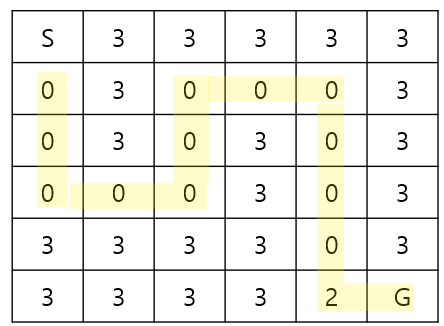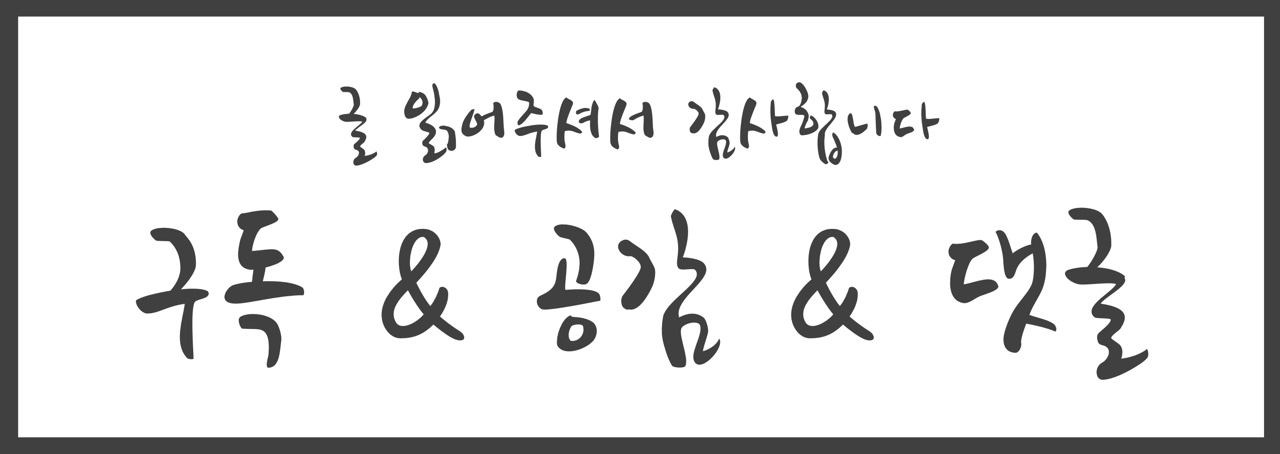반응형
출처: SWEA
Input
2
4
0100
1110
1011
1010
6
011001
010100
010011
101001
010101
111010
Output
#1 2
#2 2
BFS 처리할 때, 재방문 여부를 어떻게 할지 고민할 수 있는 문제입니다.
작업시간만 최소비용이라면 실제 거리는 어떻든 상관 없습니다.

여기서 단순히 BFS의 방문표시하여 재방문하지 않으면 최선의 경로가 탐색되지 않습니다.
단순히 방문여부를 확인하는 것이 아니라 해당 지점을
복구 시간이 덜 걸린 경로인지 확인해야 합니다.

①경로로 이미 방문한 곳도 ②경로에서는 작업시간이 덜 걸렸기에
해당 지점에서 재방문 해줘야 합니다.
* 일반적인 BFS에서는 boolean visited[][]로 방문여부를 확인하였다면
이 문제는 int dist[][]로 복구 시간 정도로 방문여부를 확인.
C / C++
#include <stdio.h>
const int MAX_N = 100 + 2;
const int INF = 999999999;
const int dx[] = { -1, 1, 0, 0 };
const int dy[] = { 0, 0, -1, 1 };
struct Vertex
{
int x, y, cost;
};
struct Queue {
int fr, re;
Vertex arr[MAX_N * MAX_N * MAX_N * 4];
void init()
{
fr = re = 0;
}
void push(Vertex data)
{
arr[re++] = data;
}
Vertex pop()
{
return arr[fr++];
}
int size()
{
return re - fr;
}
bool empty()
{
return size() == 0 ? true : false;
}
}q;
int n;
int map[MAX_N][MAX_N], dist[MAX_N][MAX_N];
char str[MAX_N];
int BFS()
{
q.init();
// 처음 출발점(S)에서 시작
q.push({ 0, 0, 0 });
while (!q.empty()) {
Vertex v = q.pop();
for (int i = 0; i < 4; i++) {
int nX = v.x + dx[i];
int nY = v.y + dy[i];
// 배열 범위를 벗어나는지 확인
if (nX < 0 || nY < 0 || nX >= n || nY >= n) continue;
// (현재 탐색에서) 해당 지점까지의 작업시간
int newCost = v.cost + map[nX][nY];
// 이미 방문한 곳에서도 시간이 좀 더 단축된 Path인지 확인
// 이미 다른 경로에서 좀 더 빠르게 도달했다면 굳이 탐색할 필요가 없다.
if (dist[nX][nY] <= newCost) continue;
// 해당 지점 방문시간 갱신 (더 오래 걸리는 Path의 방문을 막기 위함)
dist[nX][nY] = newCost;
// 계속해서 탐색
q.push({ nX, nY, newCost });
}
}
return dist[n - 1][n - 1];
}
int main() {
// freopen("input.txt", "r", stdin);
int TC; scanf("%d", &TC);
for (int tc = 1; tc <= TC; ++tc)
{
scanf("%d", &n);
for (int i = 0; i < n; i++) {
scanf("%s", str);
for (int j = 0; j < n; j++) {
map[i][j] = str[j] - 48;
// 임의의 큰 수로 초기화
dist[i][j] = INF;
}
}
printf("#%d %d\n", tc, BFS());
}
}
Java
import java.util.LinkedList;
import java.util.Queue;
import java.util.Scanner;
public class Solution {
// 임의의 큰 수
private static final int INF = 999999999;
// 상하좌우
private static int[] dx = { -1, 1, 0, 0};
private static int[] dy = { 0, 0, -1, 1};
private static int[][] map, dist;
private static int n;
public static void main(String[] args) {
Scanner sc = new Scanner(System.in);
// TestCase
int tc = Integer.parseInt(sc.next());
int probNo = 1;
while (tc-- > 0) {
n = Integer.parseInt(sc.next());
map = new int[n][n];
dist = new int[n][n];
// 배열 입력
for(int i=0; i<n; i++) {
String str = sc.next();
for(int j=0; j<n; j++) {
map[i][j] = str.charAt(j) - '0';
// 임의의 큰 수로 초기화
dist[i][j] = INF;
}
}
// 정답 출력
System.out.print("#" + (probNo++) + " ");
System.out.println(BFS());
}
}
private static int BFS() {
Queue<Vertex> queue = new LinkedList<>();
// 처음 출발점(S)에서 시작
queue.offer(new Vertex(0, 0, 0));
while(!queue.isEmpty()) {
Vertex v = queue.poll();
for(int i=0; i<4; i++) {
int nX = v.x + dx[i];
int nY = v.y + dy[i];
// 배열 범위를 벗어나는지 확인
if(nX < 0 || nY < 0 || nX >= n || nY >= n) continue;
// (현재 탐색에서) 해당 지점까지의 작업시간
int newCost = v.cost + map[nX][nY];
// 이미 방문한 곳에서도 시간이 좀 더 단축된 Path인지 확인
// 이미 다른 경로에서 좀 더 빠르게 도달했다면 굳이 탐색할 필요가 없다.
if(dist[nX][nY] <= newCost) continue;
// 해당 지점 방문시간 갱신 (더 오래 걸리는 Path의 방문을 막기 위함)
dist[nX][nY] = newCost;
// 계속해서 탐색
queue.offer(new Vertex(nX, nY, newCost));
}
}
return dist[n-1][n-1];
}
}
class Vertex {
int x, y;
int cost;
public Vertex(int x, int y, int cost) {
this.x = x;
this.y = y;
this.cost = cost;
}
}
반응형
'PS 문제 풀이 > SWEA' 카테고리의 다른 글
| [SWEA] 4005 비밀 (0) | 2021.03.01 |
|---|---|
| [SWEA] 1868 파핑파핑 지뢰찾기 (0) | 2021.03.01 |
| [SWEA] 8382 방향 전환 (0) | 2021.03.01 |
| [SWEA] 1974 스도쿠 검증 (0) | 2021.03.01 |
| [SWEA] 1954 달팽이 (0) | 2021.03.01 |





댓글